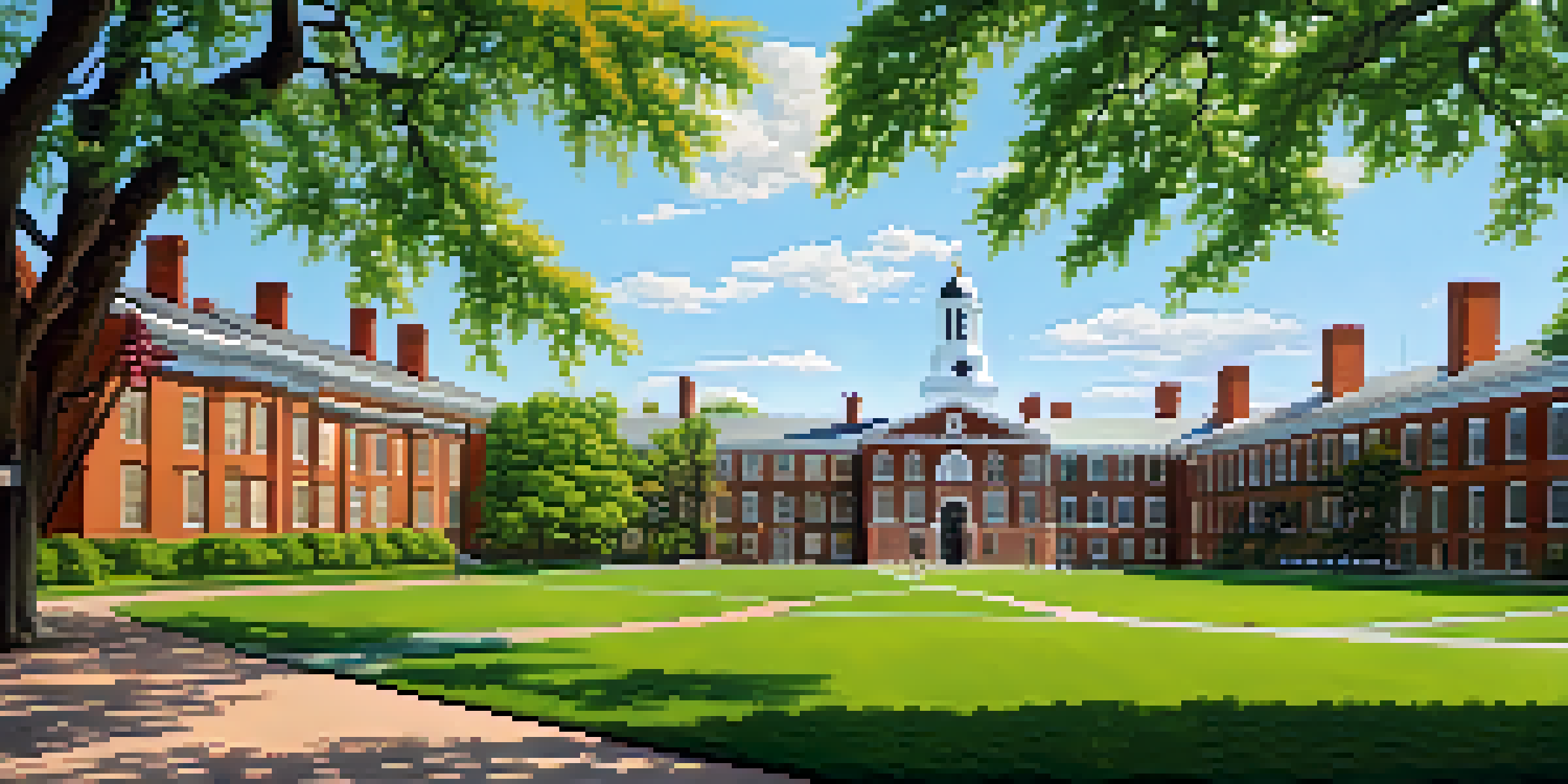Harvard University: The Educational Beacon of Early America

Harvard's Founding: A Vision for Higher Education
Harvard University, founded in 1636, is the oldest institution of higher learning in the United States. It was established by Puritan settlers who sought to create an educated clergy and leadership. The founding of Harvard was a bold move, reflecting a vision that education should be accessible and integral to society's growth.
Education is the most powerful weapon which you can use to change the world.
Initially named New College, Harvard was renamed after its first benefactor, John Harvard, who bequeathed his library and half his estate to the institution. This early support set a precedent for philanthropy in education, showcasing how community contributions could shape academic institutions. Over the years, Harvard has evolved into a prestigious university, attracting students from around the globe.
The establishment of Harvard marked a significant shift in the American educational landscape. It laid the groundwork for future universities, emphasizing the importance of a liberal arts education, which would cultivate critical thinking and informed citizenship.
The Role of Harvard in Shaping American Ideals
Throughout its history, Harvard has played a crucial role in shaping American ideals and values. The university has been a hub for intellectual discourse, producing influential thinkers and leaders who have contributed to the nation’s development. From founding fathers to modern-day innovators, Harvard alumni have significantly impacted various fields.

Harvard's commitment to public service and civic engagement reflects the university's belief in the responsibility of educated individuals. This ethos has inspired countless students to pursue careers in law, politics, and social justice, emphasizing that education is not just about personal gain but also about contributing to the greater good.
Harvard's Role in Education History
Harvard University, founded in 1636, has been a pioneering force in American higher education, promoting liberal arts and critical thinking.
Moreover, Harvard's diverse academic programs encourage students to explore complex ideas and challenge the status quo. This environment nurtures creativity and critical thinking, instilling a sense of purpose in students as they engage with pressing societal issues.
Harvard's Influence on American Higher Education
As a pioneer in higher education, Harvard has set standards that many institutions aspire to achieve. Its rigorous academic programs, esteemed faculty, and extensive resources have made it a model for universities nationwide. The emphasis on research and innovation has propelled the university to the forefront of global education.
The roots of education are bitter, but the fruit is sweet.
The establishment of graduate and professional schools at Harvard has further expanded its impact. Schools like Harvard Law and Harvard Business have shaped their respective fields, creating leaders who push boundaries and drive change. This commitment to excellence has fostered a culture of lifelong learning among its alumni.
Additionally, Harvard's role in promoting interdisciplinary studies has encouraged collaboration across various fields. This approach not only enhances the educational experience but also prepares students to tackle complex global challenges through a multifaceted lens.
Diversity and Inclusion: An Evolving Narrative at Harvard
Harvard's journey toward diversity and inclusion has been a complex one. In its early years, the university primarily served a homogeneous population, but over time, efforts have been made to broaden its reach. Today, Harvard is committed to creating an inclusive environment for students from all backgrounds.
The university actively supports initiatives that promote diversity in its student body, faculty, and curriculum. Programs aimed at recruiting underrepresented groups and fostering a sense of belonging have become integral to Harvard's mission. This dedication to inclusion not only enriches the academic experience but also prepares students for a diverse world.
Commitment to Diversity and Inclusion
Harvard actively works to enhance diversity within its community, recognizing the importance of varied perspectives in education.
However, challenges remain, and the conversation around diversity is ongoing. Harvard continues to engage in dialogue and implement strategies to ensure that all voices are heard and valued, reinforcing its commitment to social equity and justice.
Harvard's Global Reach and Influence
Harvard's impact extends far beyond the borders of the United States. With a rich history of international collaboration, the university attracts students and scholars from around the world. This global perspective enhances the academic experience, fostering a vibrant exchange of ideas and cultures.
The Harvard Kennedy School and Harvard Business School are prime examples of programs that focus on international issues. These institutions provide students with the tools to address global challenges, such as poverty, climate change, and governance. The emphasis on real-world applications ensures that graduates are equipped to make a difference on a global scale.
Furthermore, Harvard's extensive alumni network spans the globe, creating connections that facilitate collaboration across borders. This network of leaders and innovators continues to shape industries and influence policies worldwide, further solidifying Harvard's role as a global educational beacon.
Innovations in Teaching and Research at Harvard
At the heart of Harvard's mission is a commitment to innovation in teaching and research. The university continually adapts to the changing educational landscape, incorporating new technologies and methodologies to enhance learning. For instance, Harvard has embraced online education, making its resources accessible to a broader audience.
Research at Harvard is not just about academic inquiry; it aims to solve real-world problems. The university invests heavily in research initiatives that address critical issues, from healthcare advancements to environmental sustainability. This focus on impactful research attracts top scholars and fosters a culture of discovery and innovation.
Global Impact and Innovation
With a focus on international collaboration and innovative research, Harvard continues to influence global challenges and foster leadership.
Moreover, Harvard encourages interdisciplinary collaboration, allowing faculty and students to work together across various fields. This approach leads to groundbreaking discoveries and innovative solutions, reinforcing Harvard's reputation as a leader in education and research.
The Legacy of Harvard: A Continuous Journey
As we reflect on Harvard's legacy, it is essential to recognize that its journey is ongoing. The university has evolved over nearly four centuries, adapting to societal changes while remaining true to its core principles of education and public service. This adaptability is a testament to Harvard's resilience and commitment to excellence.
Looking ahead, Harvard faces new challenges and opportunities in a rapidly changing world. The university is poised to lead in addressing issues like climate change, social justice, and technological advancement, continuing its mission to educate future leaders. This forward-thinking approach ensures that Harvard remains relevant and impactful.

Ultimately, Harvard's legacy is not just about its history but also its future. By fostering a culture of innovation, inclusion, and excellence, Harvard will continue to serve as an educational beacon for generations to come, inspiring students to make meaningful contributions to society.